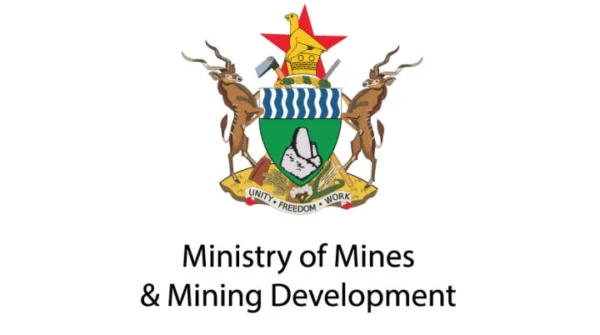Mining has long been the cornerstone of Zimbabwe’s economy. It accounts for more than 60% of the country’s export earnings, contributes about 12% to GDP, and provides employment to thousands. The sector has an even greater role to play in driving the country’s economic transformation.
By Rudairo Mapuranga
However, despite the sector’s overwhelming importance, the Ministry of Mines and Mining Development continues to operate underfunded, hindering the sector’s ability to reach its full potential.
The government’s 2025 national budget has dealt a severe blow to the mining sector’s ambitions. Out of a total budget of ZiG$276.4 billion, only ZiG$664.8 million—0.30%—was allocated to the Ministry of Mines and Mining Development. This paltry sum stands in stark contrast to the sector’s contribution to the national economy, signalling a lack of understanding of the sector’s role as a driver of growth and development. Without sufficient funding, the Ministry of Mines cannot effectively regulate or oversee the sector, nor promote the kind of value addition and industrialization Zimbabwe needs to move forward.
The consequences of this underfunding are severe. Ministry officials, including inspectors responsible for enforcing safety and environmental standards, often lack the tools necessary to perform their jobs effectively. Many inspectors are forced to work without vehicles, making it nearly impossible to monitor mining sites, especially in remote areas. This undermines the safety of miners and the sustainability of mining practices. Without adequate oversight, the risks of accidents, environmental degradation, and illegal mining activities are significantly heightened.
Zimbabwe also lacks an internationally accredited metallurgical laboratory. Miners—both small-scale and corporate—are forced to send samples abroad for testing, a costly and time-consuming process. By failing to invest in a fully functional laboratory, Zimbabwe misses an opportunity to streamline mining processes and ensure accurate testing of mineral deposits.
Properly capacitating the Ministry of Mines’ laboratory would enable miners to test their minerals domestically, saving time and money while enhancing data collection on the country’s vast mineral wealth. A local testing framework would also allow the government to enforce regulations requiring all mining entities to test minerals within Zimbabwe, boosting local revenues and transparency.
While mining struggles with chronic underfunding, other ministries with less direct economic impact have been prioritized in the national budget. The Ministry of Home Affairs and Cultural Heritage received ZiG$16,183.4 million (7.41% of the budget), and the Ministry of Defense and War Veterans Affairs was allocated ZiG$18,051.6 million (8.29%).
These figures are disproportionately higher than the ZiG$664.8 million given to the Ministry of Mines, despite mining’s pivotal role in Zimbabwe’s economic revolution.
Zimbabwe’s exploration deficit further compounds these challenges. Countries like Canada and Australia lead in exploring critical minerals essential for the global energy transition, such as lithium, cobalt, and rare earth elements. Zimbabwe, with its vast deposits of these minerals, lags due to insufficient exploration funding.
The government must prioritize exploration activities, particularly in areas under state control through the Zimbabwe Mining Development Corporation (ZMDC) and Defold Mine, to unlock the country’s full mineral potential.
One alarming consequence of underfunding is the inability to promote value addition and beneficiation. Instead of exporting raw minerals, Zimbabwe could generate more revenue by processing them domestically. Countries like South Africa and Botswana have successfully implemented beneficiation policies, but Zimbabwe lags due to insufficient financing support. Construction of smelters, refineries, and other processing facilities should be a national priority. However, the Ministry of Mines lacks the resources to advance this agenda significantly.
Globally, the demand for critical minerals is surging, driven by the clean energy transition. Zimbabwe has significant reserves of these minerals but risks missing out on this opportunity due to underinvestment in the mining sector. Countries like China, Australia, and Canada are positioning themselves as leaders in the critical minerals market, while Zimbabwe is being left behind. Proper funding would enable the Ministry of Mines to attract foreign investment and position Zimbabwe as a key player in the global energy transition.
Mining can drive Zimbabwe’s industrialization and broader economic agenda. Minerals produced locally are essential inputs for industries like manufacturing and agriculture. Phosphates are critical for fertilizers, essential to improving agricultural yields and food security. Base metals like copper and nickel are vital for technological infrastructure, including Ai, with transformative potential for sectors such as healthcare, finance, and education. Without adequate funding for mining, Zimbabwe will struggle to build the infrastructure and industries necessary for sustainable development.
State-owned mining companies such as ZMDC represent another underutilized opportunity. With proper investment, these entities could become significant contributors to the national economy. Zimbabwean professionals already run world-class mining operations like Zimplats, Unki, and Mimosa. Leveraging this local expertise could help Zimbabwean-owned mining operations compete globally.
If the government wants to transform its economy, it must fully provide the Ministry with adequate resources to promote beneficiation, value addition, exploration and regulation.
The Ministry is instrumental in eliminating illegal mining potentially boosting state confers.
As it stands, the ZiG$664.8 million allocation to the Ministry of Mines is grossly inadequate for a sector contributing over 60% of export earnings. Zimbabwe cannot afford to neglect mining if it hopes to build a strong, diversified economy for the future.




